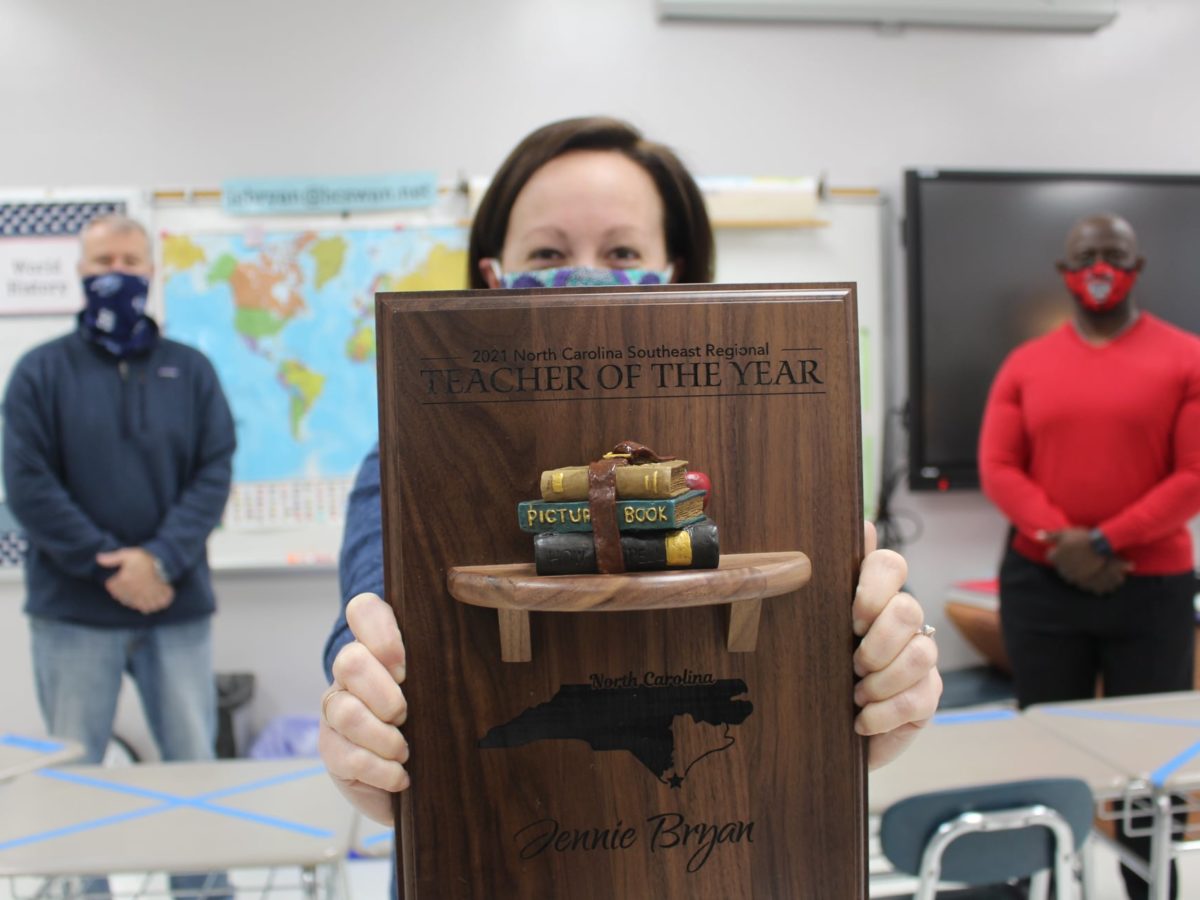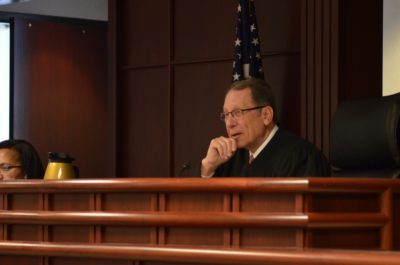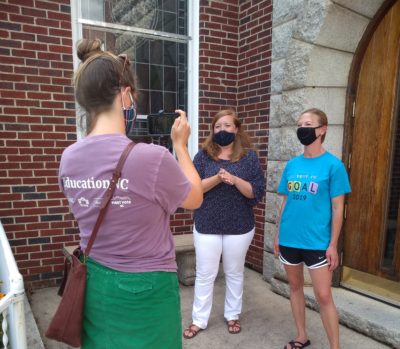

As I reflect on how I became a teacher, there’s no sweet story about how I was encouraged to seek a career in education. In fact, the truth is that I was largely discouraged from entering this profession by the adults in my life — except for my high school guidance counselor, who asked if I might pursue placement in the North Carolina Teaching Fellows program.
I politely said no thank you before she even had a chance to talk to me about what it would have been to even be a Teaching Fellow. When I enrolled in college at UNC-Chapel Hill, I knew I wanted to pursue a degree in history and would figure out what exactly to do with that somewhere along the way.
Fast forward to the spring of 2007 when I was set to graduate and still largely uncertain of my career path. I had enjoyed a rewarding honors thesis experience — and was really taken with historical research — but also felt compelled to pursue a career that would allow me to more directly serve others. After graduating, I took a gap year and volunteered with a direct service organization in eastern Kentucky.
During that time, I came across this quote, “Your mission in life is where your great joy meets a great need in the world.” It was at that moment that I knew I would become a teacher. A few months later, I found myself in the Master Teaching Fellow program at Wake Forest University.
So here I am, 1 1 years into this profession, and I’m so grateful that I made my way into the classroom. But if I’m being honest, I think I spent a few years avoiding the career path because I understood, even at that time, the lack of respect and resources for education.
I’ll never forget telling someone from back home I had decided to become a teacher. Her response was I was “too smart to be a teacher” and that I “should be a doctor or a lawyer.” All these years later, that comment still makes my blood boil. But all of this created a fear in me that the frustrations and pressures of teaching would far outweigh the rewards. Had more positive perceptions of teaching been shared with me earlier on, I may have arrived at the decision to become a teacher sooner than I did.
And so, when I reflect on my own journey of becoming an educator and consider the tone of the narrative that surrounds public education today, it is no wonder that there is a teacher pipeline problem.
How to recruit highly-qualified teachers
The message I received in what were crucial years for me in choosing a career path was, “you’re too smart to be a teacher. You should use your talents to do something for which you’ll be better respected and compensated.” Society must drastically change that narrative if we want to see improvements in the teacher pipeline.
I think we, as educators, have to consider the important role we have to play in bringing about this paradigm shift as well. Yes, there are absolutely frustrations — significant and justified frustrations — that teachers and students in North Carolina face. And yet, despite those realities, I have no regrets about becoming a teacher. And my students should hear and know that. I want prospective teachers and beginning teachers to know that.
I am committed to saying to my students, “You’re so smart. You’re so talented. You would make a great teacher. It’s not going to be easy. You’re going to have bad days, but I’ll help you, and I would be honored to have you as a colleague.”
I’m encouraged to hear about conversations like this happening in some districts — and I’m also happy to hear about some promising teacher recruitment programs being put into action, like Edgecombe County’s grow-your-own teacher pipeline program. The expansion of grow-your-own programs across the state of North Carolina is one of the goals of the Leandro short-term action plan, so I’m grateful for Edgecombe County’s leadership in this and that we have a model to follow moving forward.
But, grow-your-own programs should not replace NC Teaching Fellows. The NC Teaching Fellows program is a powerful recruitment tool that should be rebuilt into the program that it once was. The state should follow through with the 2021 Leandro short-term action plan, not only increasing funding for additional teaching fellows, but expanding the program’s partner schools from five (two of which are private universities) to eight. Included in that expansion must be at least one HBCU, as we know that increasing the racial diversity of our teaching force must be prioritized so that the teachers in our classrooms more closely represent the diversity of students in North Carolina.
Once you have the teachers, how do you keep them?
If I’m recruiting my students into this profession and asking them to trust me that this is a career worth pursuing, then there’s significant work to be done to advocate for the continual improvement of this profession. I’d feel pretty awful if years later those students I had encouraged to enter the classroom came to me saying they never should have listened to me, were regretting getting into education, and were making plans to leave education. So while we focus on getting teachers in the front door, we’ve got to make sure we close the back door and keep our best teachers teaching.
I accepted my first teaching position in 2009. It was an incredible first few years of teaching. We had a close-knit, rockstar staff full of young, energetic, and effective teachers. Out of that phenomenal group of young educators, eight are no longer in education for one reason or another. Another seven have moved on to higher education or administrator roles in education.
I would say the average years of experience of those 15 young educators who left the classroom was probably around six years. So we’re talking at least a combined 90 years of expertise and experience out of the classroom — and that’s just one school in a span of just a few years.
A 2014 joint study between the Alliance for Excellent Education and the University of Pennsylvania found that nationwide, teacher turnover costs upwards of $2.2 billion annually. We must do something to curb teacher turnover in our state. I believe there are three areas that our state must focus on to close the back door and retain our best teachers in the classroom: advanced teacher roles, prioritizing staff wellness, and competitive compensation
Advanced teacher roles
We must create more professional, compensated pathways for leadership that don’t necessarily lead to administration. There must be a way for teachers to use their expertise to expand their influence beyond the walls of their individual classrooms without leaving the classroom altogether. I have little desire to go into administration, but I know there are other ways that I could impact my school and district if there was a compensated pathway for me to do so.
The Pitt County Schools R3 Initiative is one of the advanced teacher role programs piloted in our state over the past five years. Pitt County’s R3 Initiative utilizes a distributive leadership model where facilitating teachers work with a team of cooperating teachers to resolve a problem of practice within their school. Facilitating teachers at Pitt County’s South Central High School, where I taught from 2013 – 2017, have focused on improving student outcomes in Math 1, expanding Global Education, and ACT prep.
Facilitators of the state’s ATR pilot programs recently reflected on the successes and challenges of their pilot programs in a webinar co-hosted by the Friday Institute and the Belk Foundation. All of the district leaders discussed the impact the advanced teacher roles were having on teacher retention in those districts. This is great news, and it’s also great news that one of the action steps in the Leandro short-term action plan is that funds be set aside for grants to school districts that want to create their own Advanced Teaching Roles program.
Prioritize teacher wellness
If we want to work on teacher retention rates, we must prioritize our teachers’ wellness, whether that is their physical wellness by prioritizing the vaccination of teachers, their emotional wellness by encouraging self-care and providing mental health resources, or their professional wellness through elevating teacher voice and expanding teacher leadership opportunities.
I’m encouraged by the work being done by the North Carolina Resilience and Learning Project, a Public School Forum initiative. The project’s mission is “to ensure academic success and improve the social and emotional well-being of children impacted by trauma.” A big part of that formula for student success is not just helping teachers work on self-care, but for districts and schools to work on collective care for their teachers and staff.
We, as teachers, want to bring our best selves to the classroom each day, but that’s sometimes hard to do. If we feel like our working conditions are preventing us from being effective in our jobs, then it is only natural to look for a job where we feel like we are empowered and trusted to be effective professionals. Even without a pandemic, the demands on an educator can be overwhelming.
There are times in my career where I have felt this very deeply and personally, to the point of seeking professional treatment for anxiety in 2013. If we want to not only attract, but keep highly qualified teachers in every classroom, we must be willing to invest in and prioritize teacher wellness.
Competitive compensation
In so many aspects of society, we abide by the idiom, “you get what you pay for.” Why do we think that education is somehow exempt from this economic truism? To keep highly-qualified and effective teachers in every classroom, we must be competitively compensated.
A data point I find particularly concerning is that North Carolina teachers have the third highest wage penalty in the South, only behind Virginia and Oklahoma. A wage penalty is how much less, in percentage terms, public school teachers are paid in weekly wages relative to other college-educated workers. North Carolina teachers make 25% less relative to other college-educated workers in our state. That penalty is only 13% in South Carolina.
We all know that teachers don’t enter this profession to get rich, but neither should we carry such a significant wage penalty for choosing this career. I am hopeful that in this year’s legislative session we will finally see master’s pay for educators restored and that the governor and General Assembly will work together on a budget that sees through on the Leandro short-term action plan to raise teacher salaries by an average of 5% in 2021. Once again, I’ll point back to that $2.2 billion annual price tag that comes along with teacher turnover. What our state and our students truly can’t afford is to lose more teachers.
In closing, having a qualified and well-prepared teacher in every classroom is something that I will continue to champion as the 2021 Burroughs Wellcome Fund Southeast Regional Teacher of the Year. I’ve got skin in this game not only because it is a profession that I love, full of people that I love, but I have a 3 ½ year old daughter who will be entering North Carolina public schools before I know it.
Everyday, she is a reminder to me of why we can’t fail on this. She and all of the other children of the state of North Carolina deserve a qualified and well-prepared teacher in every classroom, and there are students in our classrooms right now who will become just those teachers. We as teachers and education leaders must plant those seeds in the minds of our brightest and best students — but we also have to make sure that we have created the right conditions in the field of education for those seeds to not just grow but to thrive.







